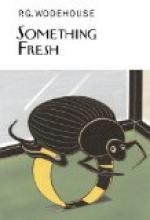There was something not only startling but shocking in the thought; for she was honest enough with herself to recognize that Freddie, her official loved one, might have paced the grounds of the castle chewing an unlighted cigar by the hour without stirring any emotion in her at all.
And she was to marry Freddie next month! This was surely a matter that called for thought. She proceeded, gazing down the while at the perambulating George, to give it thought.
Aline’s was not a deep nature. She had never pretended to herself that she loved the Honorable Freddie in the sense in which the word is used in books. She liked him and she liked the idea of being connected with the peerage; her father liked the idea and she liked her father. And the combination of these likings had caused her to reply “Yes” when, last Autumn, Freddie, swelling himself out like an embarrassed frog and gulping, had uttered that memorable speech beginning, “I say, you know, it’s like this, don’t you know!”—and ending, “What I mean is, will you marry me—what?”
She had looked forward to being placidly happy as the Honorable Mrs. Frederick Threepwood. And then George Emerson had reappeared in her life, a disturbing element.
Until to-day she would have resented the suggestion that she was in love with George. She liked to be with him, partly because he was so easy to talk to, and partly because it was exciting to be continually resisting the will power he made no secret of trying to exercise. But to-day there was a difference. She had suspected it at luncheon and she realized it now. As she looked down at him from behind the curtain, and marked his air of gloom, she could no longer disguise it from herself.
She felt maternal—horribly maternal. George was in trouble and she wanted to comfort him.
Freddie, too, was in trouble. But did she want to comfort Freddie? No. On the contrary, she was already regretting her promise, so lightly given before luncheon, to go and sit with him that afternoon. A well-marked feeling of annoyance that he should have been so silly as to tumble downstairs and sprain his ankle was her chief sentiment respecting Freddie.
George Emerson continued to perambulate and Aline continued to watch him. At last she could endure it no longer. She gathered up her letters, stacked them in a corner of the dressing-table and left the room. George had reached the end of the terrace and turned when she began to descend the stone steps outside the front door. He quickened his pace as he caught sight of her. He halted before her and surveyed her morosely.
“I have been looking for you,” he said.
“And here I am. Cheer up, George! Whatever is the matter? I’ve been sitting in my room looking at you, and you have been simply prowling. What has gone wrong?”
“Everything!”
“How do you mean—everything?”
“Exactly what I say. I’m done for. Read this.”




